#Bruce Sterling
Explore tagged Tumblr posts
Text
Cyberpunk trifecta
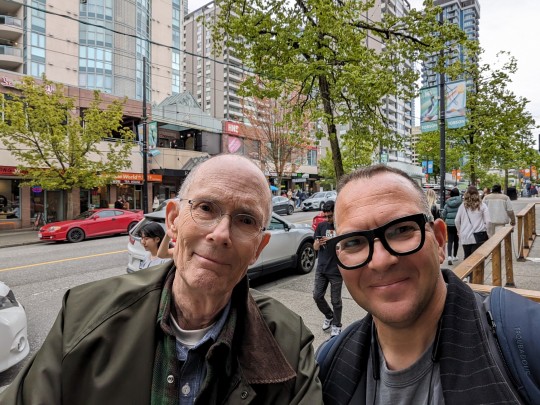
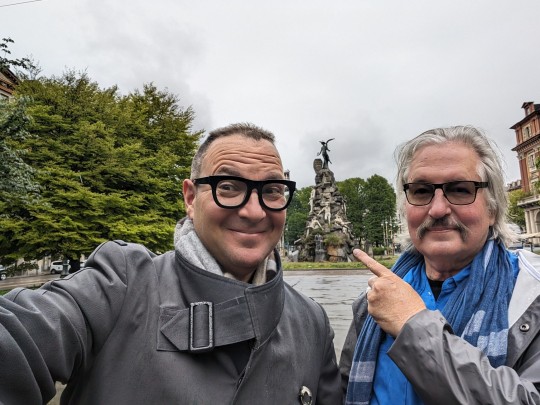
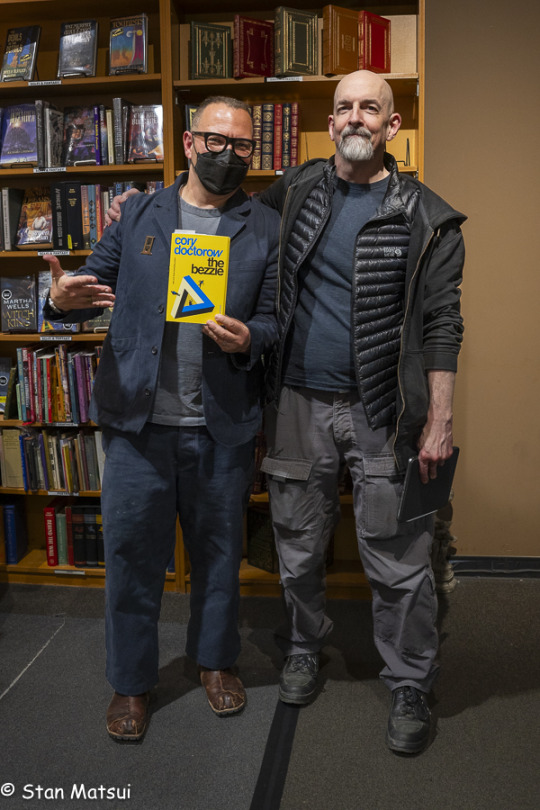
182 notes
·
View notes
Note
The idea of logging on a colonized alien planet brings my mind back to the planet Lalonde from Peter F. Hamilton's Night's Dawn books - a world that had very hard wood as its only meaningful export, and was also stuck developing its economy from agriculturalism (due to investment shortages, though).
All this is to say - Hey! What are some foundational inspirations for your sci fi verse? You gotta have some like recommendations of classic or older sci-fi for us, right? What are some of your suggestions of books and authors to read?
OK SO - My sci-fi tastes have sort of ended up in some very specific niches. Growing up, I was a Larry Niven +Jerry Pournelle man, in part because my dad amassed a huge collection of their books - then gave 90% of them away before i was old enough to read them. So one of my teenage missions was rebuilding that library, trash and all!

Stuff like Footfall, Ringworld, Gil "The Arm" Hamilton, Protector (yes i attempted to name a comic series similarly, and paid for it) "The Mote in God's Eye"... you name it, I read fuckloads of these books. And while they tend to land on a sort of human chauvinist "mankind will win based on his inherent adaptive human-ness, and the aliens will fail because of their rigid alien-ness", this shit was very foundational to me.
Their more collaborative series, The Man-Kzin Wars and War World, also loom large in my teenage mind. The Man-Kzin wars are super fun - humans meet a race of tiger-men, and go from being NWO peaceniks to roughneck cat-skinners in a generation! PEACE AND LOVE WONT DEFEAT TIGER MEN!
Similarly, war world (like lots of that 70s/80s military sci fi) was a sort of catch-all for western military nerds to play with their favorite factions - it was a planet where all the un-ruleable ethnic groups and nationalities had been deported by the authoritarian earth government, and left to rot... until a race of genetically engineered fascist super men land on the world, and start trying to rule the place. Pretty fun shit.
As I got older, I turned hard into William Gibson, and read the absolute shit out of both the Neuromancer trilogy and the Bridge trilogy, as well as his short stories. Bruce Sterling was part of that wave for me, too, and I religiously sought his old paperbacks out too. In terms of novels, "Distraction" is my favorite coherent Sterling Novel - though the short stories in the "Schismatrix" novel/collection of his remain my absolute favorite space opera pieces.
At this age, too, I found my top-top fave Sterling Stories - "Taklaman" and "Bicycle Repairman", both gritty pseudo-cyberpunk stories of the highest degree, in this collection:

This thousand-plus page collection of short stories and novellas was basically my bible for a few years - i put sticky notes on each story i loved and meant to return to, until the book was so festooned with sticky note bookmarks i abandoned the practice altogether. If you have the chance, just buy this book and chew on it for a few years.
As i got into my 20s, Charles Stross became my lode star - his books like Accelerando and Glasshouse were total game changers for me. They come with their own peculiarities, but I loved his transhuman/posthuman musings (or at least i was obsessed with his stuff for a good few years - the venn diagram of his obvious interests and my own overlapped enough that his books were great fodder for a growing sci-fi loving brain).
But since then, my main literary squeeze has been the great man, JACK VANCE. Working on Prophet, my friend @cmkosemen made a remark about how much the early issues of the series reminded him of a book series called "Planet of Adventure" or "the Tschai Cycle", by Jack Vance. The book has a beautifully simple setup - a man from an entirely undescribed spacefaring human civilization crash-lands onto a weird planet. But on that planet, he finds four separate civilizations, each who possess a population of enslaved humans, culturally and physically molded to the needs of their masters. And each book of this series covers our generic hero's interactions with each bizarre expoitative culture. I was extremely intrigued.
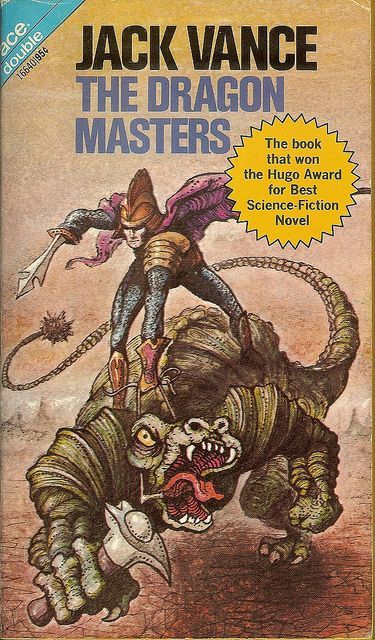
Soon thereafter, I found my current absolute favorite book - "THE DRAGON MASTERS". A book about an isolated medieval world... which gets visited, once every few generations, by a black pyramid starship, flown by a reptilian race known as the Greph. The greph capture humans to (surprise surprise) breed them into hyper specific slaves... who in turn become Greph-like in their thinking and demeanours. But the last time the BLACK PYRAMID landed, a bunch of angry medieval dudes stormed the thing, blew it up, and captured a bunch of greph... who became the breeding stock for a whole new human world of slave labour. By the time we meet this planet, the two rival lords of the human-populated regions have been breeding greph slave warriors, or "dragons", for generations, for combat against one another. But soon, the black pyramid will return...
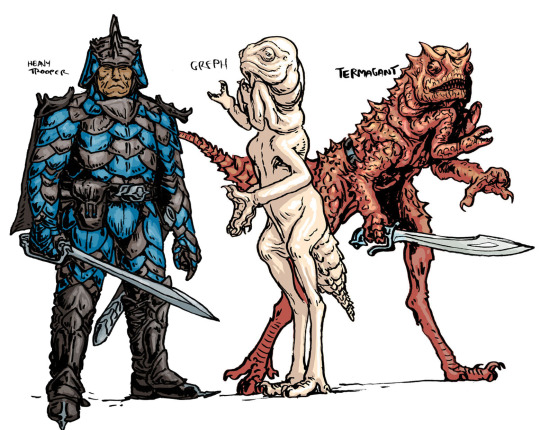
I love this book I even spent a good few months during covid talking with the Vance Estate and several publishers about developing it into a graphic novel, but nobody could quite agree on how it could get made with old Simon getting a paycheque... so sadly it fell apart. There are concept drawings floating around my patreon and other corners of the internet. But one day I'll use 'em...
My other favorite books of his, to name a couple of the MANY books of his I love:
THE BLUE WORLD: A caste system of humans, descended from a crashed prison ship, live on floating settlements on an ocean planet, paying protection to a giant long-lived intelligent crustacean. But one man is tired of giving up all his crops to this tyrannical megafauna...
THE MIRACLE WORKERS: Rival lords on a planet descended to medieval tech (surprise surprise) fight using armies... and rival SORCERORS who employ the powers of suggestion to voodoo each others' warriors... but when facing non-human intelligences, these sorceror's skills fall short.
But there are heaps more, and I love most (thought not all) of the ones i've read. They're generally short, concise, and full of all sorts of bizarre bullshit.
THere are more books i've read and enjoyed in my life, of course, but these are the core ones that I think of when I think of my career as a sci-fi reader... let me know what your top recs are!
#sciencefiction#science fiction#book recommendations#jack vance#larry niven#jerry pournelle#simon roy#griz grobus#charles stross#dragon masters#william gibson#bruce sterling
53 notes
·
View notes
Text

Rudy Rucker has posted free epub, mobi and webpage formats of the seminal sci-fi cyberpunk anthology ➡️ Mirrorshades. ⬅️
#og#cyberpunk#science fiction#sci fi#this and burning chrome are what got me started back in the day#mirrorshades#greg bear#pat cadigan#bruce sterling#william gibson#rudy rucker#lewis shiner#john shirley#tom maddox#marc laidlaw#james patrick kelly#paul di filippo
62 notes
·
View notes
Text
The Brights
Chapter 39: Thoughts and Feelings, Part 3
← Previous part Next part →
Link to master post with all chapters


Kristy: Oh. Now I get it.

Bruce: You ready?







Bruce: It's perfect.

Kristy: Bruce.

Bruce: Yes?

Kristy: Thanks for reminding me of the fun we used to have.

Bruce: I'm glad to have my old friend back.
← Previous part Next part →
Link to master post with all chapters
#the sims 4#show us your stories#the brights#kristy sheehan#bruce sterling#britechester#students being students#prank#sims#the sims#sims 4#ts4#the sims 4 story#sims story#the sims story#sims 4 story#ts4 story#the sims 4 storytelling#sims storytelling#the sims storytelling#sims 4 storytelling#ts4 storytelling#simlit#simblr#sims tumblr
4 notes
·
View notes
Text

Happy 70th, Bruce Sterling.
James George and Jae Minard’s Clouds (2014).
6 notes
·
View notes
Text

This is a free online edition of Mirrorshades, as edited by Bruce Sterling.
Posted by Rudy Rucker, September 28, 2022. And with a prayer for Tom Maddox.
Browse the book!
61 notes
·
View notes
Text

Wild this is real. Bruce Sterling's Newsweek cover story on the Lovecraftian metaphors, thought experiments, and realities of generative AI.
Gold rushes always finish ugly, and this AI rush is another one of those. It will resemble that glamorous Atomic Age transition from "energy too cheap to meter" to "garbage too expensive to bury."
21 notes
·
View notes
Video
youtube
New Nightmares - Them
#new nightmares#kurt vonnegut#martin amis#thomas disch#michael moorcock#harry harrison#lisa tuttle#edward said#bruce sterling#alan grant#john brunner
5 notes
·
View notes
Text
7 notes
·
View notes
Text
The hacker and the rocker are this decade's pop-culture idols, and cyberpunk is very much a pop phenomenon: spontaneous, energetic, close to its roots. Cyberpunk comes from the realm where the computer hacker and the rocker overlap, a cultural Petri dish where writhing gene lines splice. Some find the results bizarre, even monstrous; for others this integration is a powerful source of hope.
Mirrorshades: Preface, Bruce Sterling
2 notes
·
View notes
Text
Scam AIs....we truly are living in a dystopian cyberpunk world.
It occurs to me now that things not being what they seem, particularly technology masquerading as real life, is a running theme in cyberpunk. From Molly and Case uncovering the truth of their "boss," Wintermute; to the Replicants of "Blade Runner;" Major Kussanagi's robotic "shell;" Neal Stephenson's Metaverse, and of course the Matrix.
The spam bots and scambots we now take for granted as part of daily life were predicted decades ago by the likes of William Gibson, Bruce Sterling, Phillip K. Dick and Neal Stephenson.
Hopefully we can start to make our world a little less dystopian, by helping reliable charities.
Falling for scams does hurt people, actually
TW: Human trafficking, SA, torture, discussion of scam farms
I see a whole bunch of people arguing that they would rather risk giving to a scammer than ignore someone's gofundme. I also see people saying things like "I can't believe some sick people are profiteering off genocide" and like, me neither, but I feel like you guys really don't understand who actually runs these kinds of scams and what they are.
Scams of noticeable scale-- like scam asks being sent from hundreds of accounts to every user on Tumblr!-- are typically related to organised crime in poor countries, not Susan from Milwaukee who wants a new coat and has no scruples. People get trafficked by gangs to scam farms in Asia and Africa where they're worked to the bone and tortured trying to get idiots in wealthy countries to part with their money. Genocide profiteering is pretty much the least evil thing these people do.
Here's a UN article on it. Obvious warnings for content related to human trafficking and SA.
When you donate to a scammer, you fund these organisations and give them a reason to exist. It's possible some of the fundraisers are legit. I honestly find it unlikely given I'm not seeing any from any other countries where urgent fundraisers would seem to have great reason to exist but which haven't captured the same level of attention on Tumblr-- the number of Sudanese, Congolese, Ukrainian, Burmese or Uyghur fundraisers in my DMs is a fat 0. In any case, there are safer ways to help.
If you want to help (which is great!) you don't have to take the risk of paying for human trafficking. Donate to legitimate charities which have the resources to safely and effectively ensure the money and help is getting to the right people. Funding human trafficking rings in Myanmar is not a good risk to be taking while trying to help.
#cyberpunk#dystopoia#ai#artificial intelligence#program#science fiction#scifi#war#scam bots#gofundme scam#charity#william gibson#neal stephenson#bruce sterling#phillip k dick#blade runner#neuromancer#snow crash#the matrix#metaverse#ghost in the shell#major kusanagi#wintermute#molly millions#molly#case#Sprawl trilogy#razor girl#robot#android
5K notes
·
View notes
Text
The Brights
Chapter 34: Beach Episode, Part 3
← Previous part Next part →
Link to master post with all chapters





Ned: Why did your phone become so very interesting all of a sudden?
Beren: No reason.

Ned: Are you trying to ignore the person over there?


Beren: What? No… Um…
Ned: You are!

Ned: You should go talk with him.
Beren: But what if-

Ned: Could you maybe try to stop overthinking things for once?
← Previous part Next part →
Link to master post with all chapters
#the sims 4#show us your stories#the brights#beach episode#britechester#beren bright#duplicate ahriman#ahriman#cameron fletcher#daisy shane#kristy sheehan#janie johnson#bruce sterling#julia wright#jayden armstrong#larry the lobster#ned whalen#liberty lee#summer holiday#travis scott#sims#the sims#sims 4#ts4#the sims 4 story#sims story#the sims story#sims 4 story#ts4 story#the sims 4 storytelling
9 notes
·
View notes
Text
BRUCE STERLING MUST SWIM
CHROME IS GONE THE POOL23 RISEN THE MUTATION IS A STEP TOWARDS P3RF3CT10N https://dreams-of-an-electric-mind.webflow.io/eternal Ponderous Orb-session – The Cosmic Liminality FREE JACOBO GRINBERG https://psi-encyclopedia.spr.ac.uk/articles/jacobo-grinberg-zylberbaum#Syntergic_Theory ENTER THE FORUM: https://fnord.forumeiros.com/t449-kstxi-ksc PROBABLY JACOBO GRINBERG ENDED UP HERE…

View On WordPress
0 notes
Text
The King stood, yanked the documents down, cast them onto his padded floor. ‘You see, sir, it don’t really matter a hang what nonsense is blithered and babbled on these bills! The secret truth is, that bills is endless by their very nature, regular as the tides in the Thames, or the smoke of London. London’s true sons call London ‘The Smoke’, you know. She’s an eternal city, like your Jerusalem, or Rome, or, some would say, Satan’s Pandaenonium! You don’t see the King of the Bill-Stickers worrying for smoky London, do you? Not a bit of it!’
William Gibson and Bruce Sterling, The Difference Engine
#the difference engine#william gibson#bruce sterling#1990#1990s#20th century#american literature#queue pierce my soul
1 note
·
View note
Text
You could try Bruce Sterling's Schismatrix.
It deals with a solar system split into two competing factions; Mechanists who modify their bodies through technology and computers (the traditional cyberpunk model), and Shapers who adapt theirs through genetics or biological alterations.
why is biopunk only ever used as horror? Where’s the biopunk equivalent of cyberpunk edgerunners? Give me a Sci fi setting with dungeon meshi style chimeric modifications as a primary worldbuilding mechanic.
extra arms, giant monster body from the waist down… go to a sketchy grafting parlor and get some budget bioelectricity organs that give you Lichtenberg burns every time you use them. Give me a character that wears a mask for half the story and then reveals that they’ve got three rows of teeth, six tongues, and heavily paralytic saliva.
I don’t know, maybe Tumblr User Heron Knight Georg, who repeatedly fantasizes about molting like a cicada, gets gender envy from bloodborne bosses, and thinks that the Bone Turner’s Tale would be the perfect summer read, is an outlier and should not have been counted, but I know what website I’m on. I know just how gender affirming having six arms or feathers instead of body hair would be for most of the people here.
I think there’s some potential here if biopunk is used for more than scorn-level H.R Giger dystopian shenanigans. Give me biopunk 2077.
2K notes
·
View notes
Text
When Is The Audience? | 2427
Atemporal thinking is crucial in today’s fractured media landscape.
Instead of optimising for immediate visibility, you always have the opportunity and option to create for a future audience. One that’s somewhere in the long tail. If you’re willing to embrace that, you don’t need to worry about algorithms or trends.

View On WordPress
#Atemporality for the Creative Artist#Bruce Sterling#creating#creative advice#creativity#creators#jay springett#permanently moved#podcast#social media#youtube
1 note
·
View note